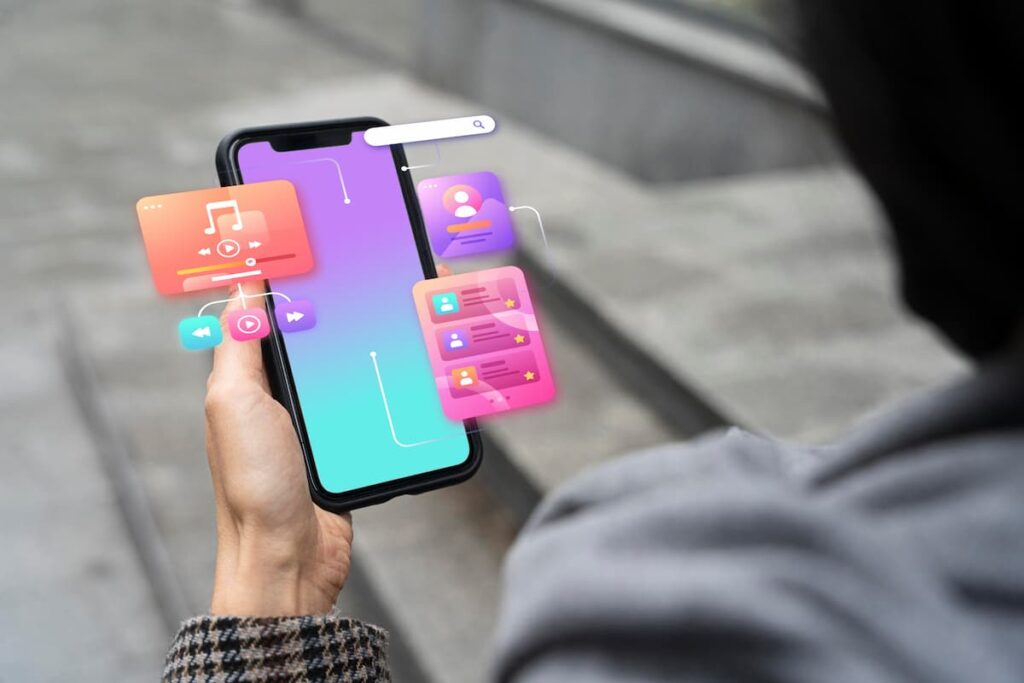Table of Contents
Your start-up idea is undeniably important, but it gets more appealing to potential investors when it includes a mobile-based solution. The reason is simple – globally, people spend between 3 to 4 hours daily on mobile apps, which have become an integral part of our lives due to their ability to provide instant solutions. Thus, choosing the right technology for mobile app development is our top priority, given the important role of mobile solutions today.
The types of mobile apps: what suits you best?
For mobile app development, engineers typically rely on one of three primary types of software frameworks or libraries. These provide the foundational structure required for building mobile applications tailored to specific environments and platforms.
Native applications
Native mobile app frameworks enable developers to create applications specifically designed for certain operating systems and platforms, like Windows, Android, or iOS. For example, Java and Kotlin are used for native Android app development, while Objective-C and Swift are used for native iOS apps. The key advantages include:
- Optimized performance: Native apps demonstrate high performance as they’re developed and optimized for their specific platform, resulting in faster and more responsive experiences. They use the device’s processing speed for quick load times since they’re built with the platform’s core programming language and APIs.
- Superior user interaction: Native apps leverage the device’s hardware and software, including GPS, camera, and microphone, facilitating faster performance and a richer user experience. They also benefit from direct push notification services via platform-specific servers like APNS for iOS.
- Fewer bugs in development: Native app development generally encounters fewer bugs compared to maintaining a single codebase for cross-platform apps. This approach minimizes dependencies and issues, leading to a smoother development process and a better end product.
Web apps
Cross-platform frameworks take a different approach, allowing developers to create mobile apps using familiar web technologies and languages. This reduces the learning curve and development time compared to native app development. By using frameworks such as Ionic, Xamarin, React Native, and Flutter, organisations can build both mobile-optimised progressive web apps (PWAs) and fully native applications for iOS and Android from a single codebase. This cross-platform approach offers a versatile and efficient development process. The key benefits of Web Native development include:
- Accelerated development: Developing applications with Web Native methods significantly reduces the time from concept to launch. This efficiency is due to the use of common web technologies, which streamlines the development process.
- Familiar technologies: Web Native development leverages well-known web frameworks, languages, and technologies allowing developers to employ their existing skills and knowledge, facilitating easier and more efficient development workflows.
- UI customization: It offers flexibility in customizing applications’ user interfaces. Developers have the freedom to design and modify the UI layer, ensuring that the application meets their project’s specific aesthetic and functional requirements.
Hybrid apps
Hybrid frameworks combine elements of both native and cross-platform approaches. They allow developers to incorporate web technologies like HTML5, CSS3, and JavaScript into native mobile applications using plugins. Hybrid frameworks aim to leverage web technologies while still accessing native device capabilities. Advantages of hybrid mobile apps:
- Cost-efficiency: Creating a single codebase that works across multiple platforms reduces development costs compared to developing separate native apps for each platform. This is particularly beneficial for start-ups and small businesses with limited budgets.
- Cross-platform compatibility: Hybrid apps inherently offer cross-platform functionality, working smoothly on both iOS and Android with minimal code adjustments. This broadens the app’s reach, ensuring it can cater to a wider audience.
- Access to native features: Hybrid apps can use native device capabilities such as the camera, GPS, and contacts through plugins and APIs. This enables the creation of comprehensive apps that offer a smooth user experience similar to native apps.
Learn how to choose the best mobile app development framework in our blog! Native, Web or Hybrid App: Choosing the Right One for Business
Mobile application users’ behaviour: What is it like in 2024?
The push to develop mobile apps is driven by their deep integration into our daily lives, offering convenience for tasks like learning languages, ordering rides, or tracking fitness. The ubiquity of smartphones has boosted mobile apps into a central role.
What’s more important, mobile apps cater to the way people use their devices: the average smartphone user spends around 3 hours and 10 minutes per day on their device, with a staggering 2 hours and 51 minutes – nearly 90% of that time – spent actively using apps. Understanding this consumer behaviour highlights why developing compelling mobile apps is so critical for any business today.
According to the report by Statista, the most popular app categories among smartphone users in the US, include the following.
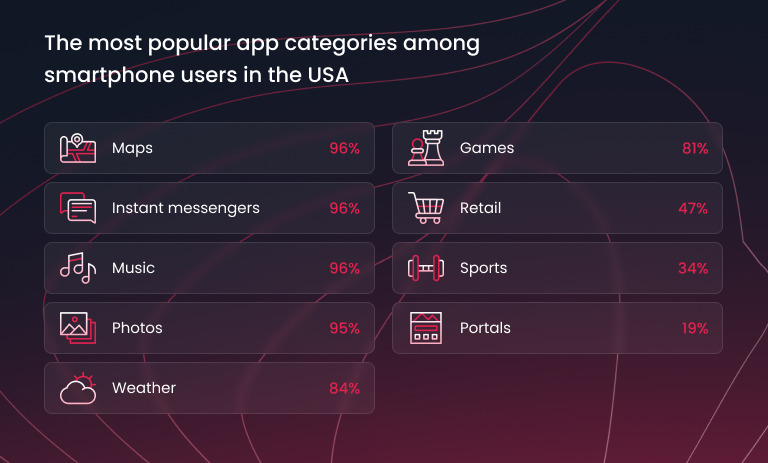
Mobile app industry highlights
- Mobile apps are projected to bring in more than $935 billion in revenue by the end of 2024 as per Statista.
- The App Store offers 1.96 million apps for users, while Google Play features 2.87 million apps available to download.
- 21% of Millennials engage with an app over 50 times daily.
- Nearly half (49%) of users open an app more than 11 times daily.
- Mobile apps account for 70% of all digital media time in the U.S.
- On average, smartphone owners use 10 apps daily and 30 apps monthly.
Best mobile app development frameworks
Let’s explore the top leading mobile technologies in 2024.
Python
Python is one of the most popular technologies used in mobile application development today. Its popularity among developers and businesses stems from its ability to streamline and accelerate the app development process. As an open-source, high-level, and portable programming language, Python offers several key advantages:
- Support of object-oriented programming paradigms
- Integrated debuggers
- Vast community support
- GUI programming capabilities
- Extensive frameworks and libraries
Python’s core strength lies in facilitating the rapid creation of scalable and feature-packed mobile apps. Its focus on simplicity, portability, and a rich ecosystem of tools makes it a compelling choice for mobile app development.
Among the best Python apps is Instagram – with 2.4 billion active users, Instagram ranks 4th among the biggest social media networks globally as of 2024.
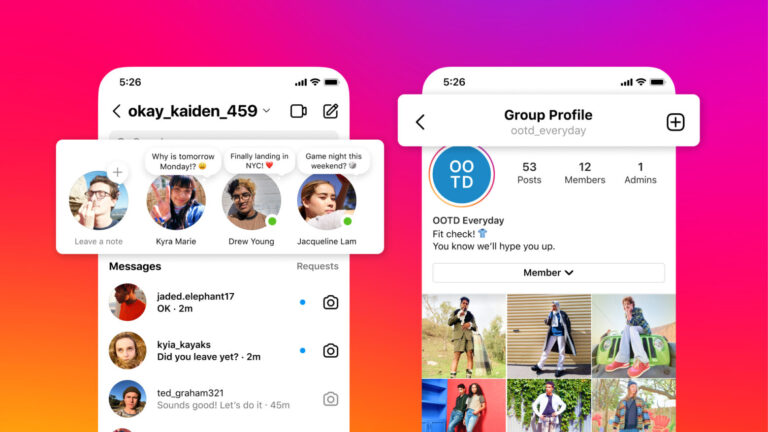
Flutter
Flutter is an open-source mobile app development SDK created by Google. It is designed to enable developers to build cross-platform applications efficiently. Its key strength lies in allowing developers to create a single application that runs smoothly on both iOS and Android platforms, eliminating the need to build separate native apps from scratch for each platform.
Flutter utilises Dart, a modern programming language, to construct high-performance, visually attractive user interfaces that provide a native-like experience. By abstracting away the underlying platform differences, Flutter empowers developers to write code once and deploy it across multiple operating systems.
Java
Java, an object-oriented programming language with a legacy older than most technologies in use today, is renowned for its reliable security features and user-friendly nature. It is a preferred choice among developers, complemented by an extensive array of open-source libraries, widespread community support, and thorough documentation, facilitating a diverse range of Android development applications.
A prime example of a Java-based app is Spotify, which is estimated to have over 11 million artists and creators and boasts 574 million monthly active listeners as of 2024.
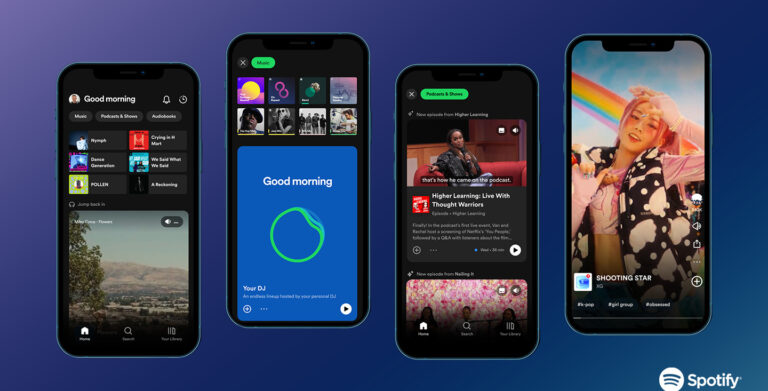
Swift
Swift, developed by Apple Inc., is a general-purpose programming language designed for versatility across platforms such as iOS, macOS, tvOS, and Linux. It is a popular choice among developers, with approximately 58-60% adopting it for creating software solutions tailored to both small and large enterprises.
Swift stands out for its cross-platform capabilities and efficient coding methodology. The language’s Playground feature is highly beneficial for developers looking to experiment with new ideas and designs. While Swift excels in developing advanced server applications and offers a robust platform for Apple’s ecosystems, it’s important to note that it does not directly support Android app development.
Slack, recognised for its team communication and collaboration capabilities, is used by over 600,000 companies worldwide. In an effort to modernise its mobile applications, the company made a strategic shift to the Swift language for its iOS app development.
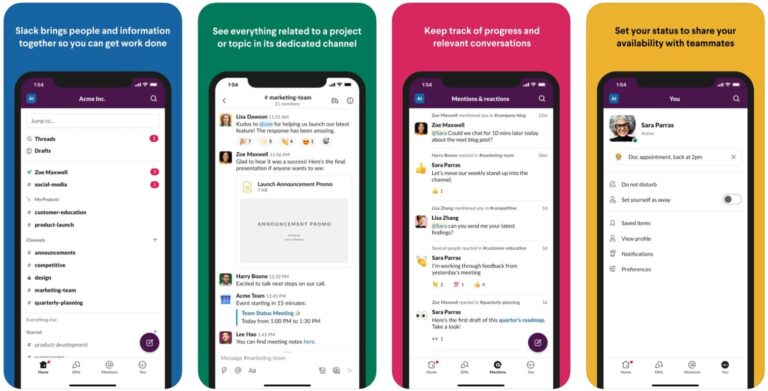
React Native
React Native, developed by Facebook, is an open-source framework designed for building cross-platform applications that can run on both iOS and Android. Apps developed with React Native deliver a performance that closely mimics native applications and are capable of operating across multiple platforms. By integrating React Native with JavaScript, companies can create applications that offer an excellent user experience across a variety of devices, ensuring consistency and high-quality interaction for users on any platform.
With ambitious goals of becoming the world’s largest online retailer, Walmart opted for React Native development to gain a competitive advantage. React Native’s cross-platform capabilities and seamless user experience across devices likely contributed to Walmart’s decision to use this technology in pursuit of its bold objectives.
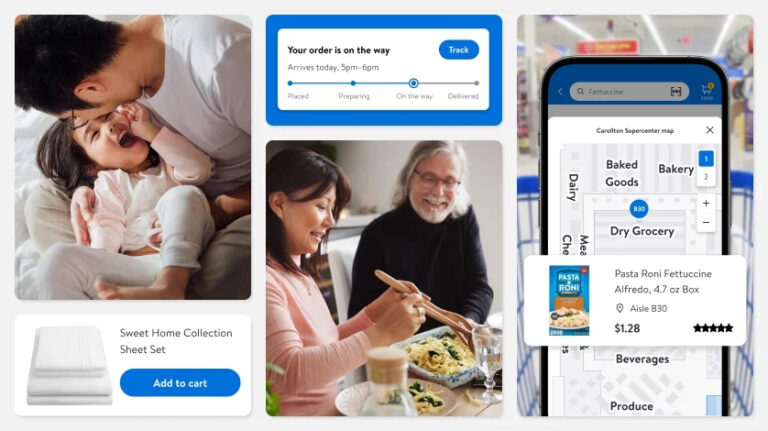
Kotlin
For startups focused on designing complex mobile applications, Kotlin emerges as a prime choice. Kotlin is a cross-platform programming language that maintains complete compatibility with Java. Its simplicity, security features, and extensive tool support make it an attractive option for Android app development.
Pinterest, one of the popular photo-sharing social apps that enables users to upload, share, and save images, is a prime example of a company that adopted Kotlin. The company officially moved from Java to Kotlin in 2016 and showcased the advantages of this initiative at Droidcon NYC 2016, highlighting Kotlin’s suitability for developing complex mobile applications.

Ionic
Ionic stands out as a renowned open-source framework dedicated to the development of HTML-based applications, with a strong focus on user interface elements—how an app looks, feels, and operates. Celebrated for its versatility, Ionic empowers businesses to design progressive web apps, cross-platform, and hybrid applications that deliver a cohesive user experience across different devices and operating systems. If you’re navigating tight timelines and budget constraints, Ionic presents itself as an advantageous choice, offering an efficient pathway to develop visually appealing and functional apps.
Sworkit, a premium fitness app that provides personalised workout plans and handy resources to empower people to lead a healthy lifestyle, is a notable example of an Ionic-based application. With 3 million monthly active users and more than 10 million downloads, Sworkit showcases the potential of Ionic in creating successful and widely adopted cross-platform apps.

Xamarin
Xamarin, a brainchild of Microsoft, was engineered with the aim of empowering .NET developers to craft swift and innovative applications for both iOS and Android platforms. As an open-source, multi-platform development framework, Xamarin allows for app development using C#, offering a streamlined and efficient development process. Thanks to its cross-platform capabilities, Xamarin significantly accelerates development timelines and cuts down costs, making it a perfect choice for startups operating on tight development budgets.
Storyo, a mobile app built with Xamarin technology, serves as an excellent example of Xamarin’s capabilities. This storytelling app enables users to create videos out of photos and presents them in a story form with contextual information. The fact that Storyo is currently active in 170 countries highlights the cross-platform versatility and reach that Xamarin can provide to mobile app development projects.
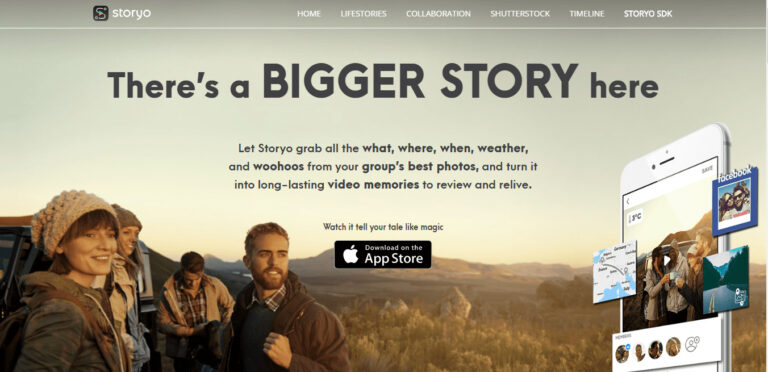
Trending mobile development technologies
Staying abreast of new technological trends and methodologies in mobile app development is important, regardless of the specific audience or niche your app targets. Gaining insights into the latest advancements can deepen your understanding of both the conceptual and practical aspects of your product, unveiling the most efficient strategies for improvement.

Augmented Reality
As more companies recognise the value of AR in improving their services and engaging customers, we can expect to see a significant increase in the development and usage of AR-based applications in 2024 and beyond. This shift towards using AR technology marks a new era in how businesses interact with their customers, offering more interactive and personalised experiences.
The integration of AR and VR into mobile apps has the potential to shake up various industries, from retail and eCommerce to gaming and education. By blending digital information with the physical world, these technologies can provide users with an unprecedented level of contextual information and engagement.
The IKEA Place app is an excellent example of how AR can provide a practical and immersive experience for users, allowing them to visualise products in their actual environment before making a purchase decision.

Contact us to learn more about our AI and AR solutions!
AI and Machine Learning
You make an excellent point about the growing integration of predictive analytics, artificial intelligence, and machine learning in the mobile app sector, particularly in the domain of mobile applications. These technologies are proving invaluable in gathering and analysing consumer insights, which can then be leveraged to drive more informed decision-making processes.
Today, the trend of embedding AI and ML into mobile applications is indeed set to accelerate. This strategic incorporation enables businesses to gain a competitive edge by:
- Uncovering new opportunities: the integration of AI and ML in mobile apps opens up opportunities for predictive maintenance, intelligent chatbots, and even real-time language translation, further enhancing the overall user experience. Also, AI/ML can help identify emerging trends, market gaps, and potential areas for growth or innovation based on user data and behaviour patterns.
- Refining services: By analysing user interactions and preferences, businesses can continuously optimise their app features, user experience, and services to better cater to customer needs.
- Decoding customer purchasing patterns: AI/ML algorithms can detect and analyse intricate patterns in consumer behaviour, allowing for more accurate predictions of buying habits and personalised recommendations.
By embracing these cutting-edge technologies, businesses can take a more tailored and insightful approach to meeting market demands and deliver highly personalised experiences that resonate with their target audience.

Blockchain
While the financial sector has been at the forefront of blockchain adoption, with banks and institutions exploring its potential for secure transactions and record-keeping, the applicability of this technology is by no means limited to finance. Companies across diverse industries are actively investigating ways to integrate blockchain into their operations, recognising its potential to streamline processes, enhance transparency, and ensure data integrity.
Some potential applications and use cases of blockchain in various industries include:
- Supply chain management: Blockchain can provide end-to-end transparency in supply chain operations, enabling companies to track the movement of goods, verify authenticity, and ensure compliance with regulations.
- Healthcare: Secure and decentralised storage of medical records, enabling seamless data sharing among healthcare providers while ensuring patient privacy and data integrity.
- Identity management: Blockchain-based digital identities can provide individuals with secure control over their personal data, reducing the risk of identity theft and fraud.

Biometric identification
The adoption of biometric technology, such as facial recognition and fingerprint readers, is a significant step forward in ensuring privacy and data protection. The integration of biometric verification not only streamlines processes by making them faster but also significantly bolsters security measures.
Biometric authentication adds an extra layer of security by tying the transaction to the user’s unique biological characteristics, making it much harder for unauthorised individuals to gain access or conduct fraudulent activities.
Furthermore, the implementation of biometric technology in enterprise mobile applications is a game-changer for safeguarding sensitive business data. By employing advanced biometric verification methods, companies can significantly reduce the risks associated with data breaches, unauthorised access, and cyberattacks. This trend aligns with the increasing importance of data privacy and compliance with regulations, such as the General Data Protection Regulation (GDPR) and industry-specific data protection laws.
Read more in our blog AI adoption framework: technology/privacy/ security/data point of view and EU AI act
The integration of biometric security measures within mobile development technologies represents a substantial leap forward in protecting critical business information. It not only offers efficiency by streamlining authentication processes but also provides unprecedented levels of security by ensuring that only authorised individuals can access sensitive data.
Looking ahead, we can expect to see further advancements and widespread adoption of biometric technology in mobile app development, driven by the ever-increasing demand for data privacy, security, and regulatory compliance across various industries.
Explore what’s possible with our AI-powered image recognition software solutions
Internet of Things
The Internet of Things (IoT) is the networking of physical devices, objects, and machines enhanced with software and sensors for data exchange. This technology is significantly shaping market trends, particularly in the mobile app space.
The growing demand for IoT devices is attributed to their adaptability, user-friendliness, and connected mobility, largely driven by their seamless integration with smartphones via mobile apps.
Integrating mobile apps with IoT devices improves data logging, tracking, and exchange capabilities, offering a more agile framework compared to traditional websites. This advanced interconnectivity streamlines data analysis while amplifying the functionality of mobile apps when paired with IoT technology. As a result, the convergence of mobile apps and IoT devices is becoming increasingly common. This trend is going to drive market growth as the synergy between mobile applications and IoT devices unlocks new dimensions of data utility and user experiences.
The bottom line
Mobile app development is at the forefront of providing reliable and practical solutions, keeping pace with the latest technological advancements. Businesses are increasingly focusing on mobile apps as a strategy to attract and retain loyal customers, recognising that consumers now expect a wide range of services to be readily accessible through mobile applications.
As we look toward the future, a multitude of industries will come to consider apps not just as a complementary aspect of their business but, in many cases, as a primary revenue stream.
How we can help you to build mobile apps?
At Altamira, we provide a suite of software development services tailored to make a tangible impact on your growth and productivity. We specialise in:
- Technology consulting and continuous productivity improvement of software development
- Vendor transfer utilising a proven approach
- Mobile and web product development and end-to-end delivery
- Delivering Artificial Intelligence solutions to improve productivity and bring new capabilities
- Fast and efficient team augmentation, whether in-house, outsourced, or distributed
Our process begins with an initial consultation where we interview you to thoroughly understand your specific needs and goals. Based on this understanding, our experienced team of developers and designers carefully selects the most appropriate tools and technologies to create a high-quality, tailored digital solution for you from the ground up.
Throughout the entire development lifecycle, we maintain open communication and provide you with regular progress updates, ensuring transparency and keeping you informed at every stage. Our team’s meticulous attention to detail allows you to focus on your core business while we handle the intricacies of bringing your digital solution to life.
If you’re looking for a reliable tech partner, contact us, and we’ll get back to you to discuss your unique app development project.

